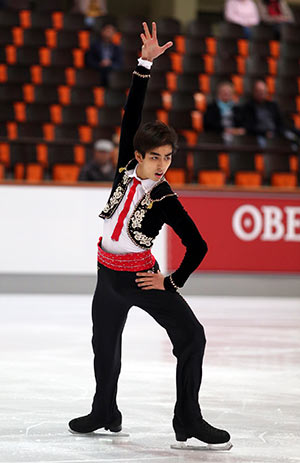In the lobby of a luxury hotel, Michael Christian Martinez balanced on one leg and swung the other forward. The lanky 17-year-old was on the ball of his foot and looked like he was about to spring upward into the air. Philippine figure skater Michael Christian Martinez performs in the 2013 Nebelhorn Trophy competition in Oberstdorf, Germany. Martinez, ranked fifth in the World Junior Figure Skating Championships, will be the first skater to represent the Philippines in the Winter Games in Sochi, Russia, in February. (CNS photo/Robin Ritoss)
Philippine figure skater Michael Christian Martinez performs in the 2013 Nebelhorn Trophy competition in Oberstdorf, Germany. Martinez, ranked fifth in the World Junior Figure Skating Championships, will be the first skater to represent the Philippines in the Winter Games in Sochi, Russia, in February. (CNS photo/Robin Ritoss)
“I’ve been in therapy for almost three weeks,” said Martinez. “I’m having this feeling like I need to go. It feels like I’m getting crazy like when I’m not in the ice because I’ve been there and my life (has been) in the ice for so long.”
Less than two months before the Winter Olympics, Martinez was off the ice, being treated for an inflamed knee. He told Catholic News Service it was one of many injuries likely caused by skating on the rough ice in the Philippines.
Martinez, ranked fifth in the World Junior Figure Skating Championships, will be the first skater ever to represent the Philippines in the Winter Games in Sochi, Russia, in February.
In eight short years, the shy kid from a Manila suburb made a life for himself on the ice, where he said he feels like he has “super powers,” despite some significant challenges. The most obvious challenge: being from a tropical country that has only two skating rinks, without competition-grade ice or competition-level training.
Martinez has asthma, which kept him indoors and away from sports for practically all of his childhood until he discovered ice skating at a shopping mall. He pushed hard for a maintenance regiment when his doctor initially advised against it. But the biggest hurdle has been scarce funds to pay for a coach at competition time.
Martinez said he regularly feels intense pressure before a competition, not because he has to impress judges, but “because of lack of training, lack of a coach. The jumps make me really nervous because they’re not consistent.”
“Before there was no one to hold on to, only my mom but no one else,” said Martinez, a Catholic. “So I’m holding on to God. Every competition I ask him for help and confidence and it really works!”
He and his mother, Maria Teresa Martinez, were convinced prayer helped him win his first senior-level gold medal at the Crystal Skate competition in Romania in 2012. Martinez followed that up with a bronze at the seniors’ New Years Cup in Slovakia in 2013.
Teresa Martinez told CNS: “I just tell him to prepare and pray, because sometimes really we cannot afford to bring the coach. … I know some skating skills, some techniques, but I’m not as good as, you know, the real coaches. So I told him just pray.
“Every competition it’s ‘Mom did you bring my Baby Jesus? Mom did you bring my Mama Mary? Mom did you bring your rosary?’”
She said each competition takes 10 days of travel and lodging for her son, herself and a coach. Because of the steep costs, which she said can run at least $10,000 each time he enters, Martinez sometimes goes before the judges without the trained eyes of an expert to give him tips and assessments between the short program and the longer free skate.
“Last time I brought him, he was first place in the short program,” she said. “I couldn’t help him much and he dropped to fifth place after the free skate. … He has missed a lot of opportunities of being on the podium because we couldn’t bring any coach.”
Martinez started training competitively five years ago, going to California for brief stints during the year. In 2010, he caught the eye of Ilia Kulik, 1998 Olympic gold medalist from Russia, who his mother said tore down what her son had previously learned about jumps and other technical feats. With the help of Kulik, Martinez landed a flawless triple jump after three months of intense training.
Martinez also learns from John Nicks, a veteran trainer whose list of students include Olympic gold medalists Peggy Fleming, Kristi Yamaguchi and dozens of national and world champions.
Teresa Martinez said they had set their sights on him being a serious contender in the 2018 Olympics and were surprised he qualified for this year’s games.
She said to train for the Olympics, Martinez’s lone sponsor, a Philippine retail and development corporation that owns the only two rinks in the country, gave Martinez more than $22,000, and the Philippine Skating Union kicked in some $11,000. She was thankful to have money enough to cover three competitions, but from August to November there were five pre-Olympic contests.
As for support from the Philippine government, “I don’t even think anyone at the president’s office knows there’s a Filipino skating in the Olympics,” said Teresa Martinez, who said she has written the office several times asking for help.
“My house is mortgaged. It’s a crazy investment,” she said.
Teresa Martinez said the family farm was hit hard by recent typhoons, and they have received financial help from family, friends and even strangers – mostly Filipino-Americans.
But it’s worth it to Martinez, who said he hopes to place in the final 24 that compete in Sochi so he can get into serious training for 2018.
“I just need to qualify … if I get support I will continue to do this,” said Martinez, whose fallback plan is to be a coach and study sports medicine. If not, “then I’ll just … study.”
